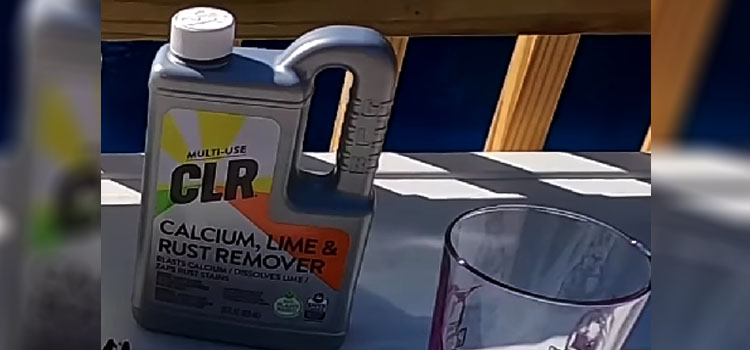Last Updated on September 16, 2024 by Shari Mason
**Storing things in Mason jars is pretty popular.** **But their metal lids rust over time, which looks bad.** **Rust doesn’t just mess with how the jar looks, it might even affect what you’ve stored inside.**
Based on my tried-and-true experience, removing rust doesn’t have to be daunting.
You can restore those lids to their former glory with a few household items and some elbow grease. Learn the simplest ways on how to get rust off mason jar lids today. Read on.
5 Ways To Get Rust Off Mason Jar Lids
1. White Vinegar Soak


White vinegar [1], a common household item, is an effective solution for removing rust from mason jar lids. The acetic acid in the vinegar reacts with rust, helping to dissolve and lift it away.
Fill a bowl with white vinegar and submerge the rusted lid entirely. Allow it to soak for several hours, ensuring the rusted parts are well-immersed.
“My playground is full of moonshine, mason jars, beer bottles, and bonfires.”
Big Smo, American Musician
After soaking, use a soft brush to scrub off any lingering rust particles gently. Finally, rinse the lid with clean water and dry thoroughly to prevent further oxidation.
This method not only tackles the rust but also preserves the integrity of the lid.
Read:
- Can I Sterilize Canning Jars In The Dishwasher?
- Do Jars Have To Be Fully Submerged When Canning?
- Can You Water Bath Can In A Regular Pot?
- Is Vacuum Sealing The Same As Canning?
2. Baking Soda Paste
Baking soda, a mild alkali, works wonders on rust when turned into a paste. Its granular nature aids in scrubbing off the oxidized particles without being too abrasive.
Mix baking soda with a few drops of water to utilize this method, forming a thick consistency. Spread this paste generously over the rusted sections of the mason jar lid.
Allow it to sit for a few hours, giving it ample time to break down the rust. Once set, scrub the paste and rust using a brush or cloth.
Rinse the lid with fresh water and ensure it’s dried thoroughly to avoid any future rust formation.
3. Lemon & Salt


The combination of lemon [2] and salt offers a natural and potent solution for rust removal. Lemon juice, rich in citric acid, acts as a gentle corrosive, while salt boosts the abrasive action to scrub away the rust.
First, use this method to sprinkle a liberal amount of salt over the rusted areas of the mason jar lid. Then, squeeze fresh lemon juice over the salt, allowing the mixture to settle and penetrate the rusted spots.
Let it sit for 2-3 hours. You might notice a mild fizzing reaction as it works, evidence of the salt and lemon interacting with the rust.
Afterward, scrub the surface with the used lemon rind or a soft brush. Rinse the lid with water and dry it thoroughly.
4. Potato & Dish Soap
It might sound unconventional, but the potato, packed with oxalic acid, is an excellent rust combatant. Combined with the cleansing power of dish soap, it becomes a formidable duo against rust.
To harness this method, cut a potato in half. Dip the freshly cut side into a small amount of dish soap.
Now, rub this soapy potato surface over the rusted areas of the mason jar lid, letting the oxalic acid in the potato work its magic on the rust.
Continue rubbing until you see noticeable improvement. Once satisfied with the result, rinse the lid with water and dry it thoroughly.
5. Commercial Rust Remover


Turning to a commercial rust remover can be the most effective choice for stubborn rust spots that resist home remedies. These specially formulated solutions are designed to tackle and dissolve rust with minimal effort.
Apply the remover to the affected areas of the mason jar lid, following the manufacturer’s instructions closely. Often, these products will require a set amount of time to act before scrubbing or rinsing.
When using commercial rust removers, wearing protective gloves and working in a well-ventilated area is crucial due to the chemicals involved.
After treating, rinse the lid thoroughly with water and ensure it’s dried entirely to prevent any recurrence of rust.
FAQs
u003cstrongu003eWhy do my mason jar lids rust?u003c/strongu003e
Mason jar lids rust primarily because of exposure to moisture, especially when combined with oxygen. u003cbru003eu003cbru003eThis results in the oxidation of the metal. Factors like storing acidic contents, washing the lids and not drying them thoroughly, or storing them in humid environments can accelerate the rusting process. u003cbru003eu003cbru003eRegular wear and tear can also compromise the protective coating on the lids, making them more susceptible to rust.
u003cstrongu003eIs it safe to use a rusted mason jar lid?u003c/strongu003e
No, using a rusted mason jar lid is not recommended, especially for food storage. u003cbru003eu003cbru003eRust can compromise the seal, potentially allowing contaminants inside. Additionally, rust can flake off into the jar’s contents, posing potential health risks if ingested. u003cbru003eu003cbru003eIf a lid shows rust, it’s best to replace it.
In Conclusion
The rust on mason jar lids detracts from their appearance and poses potential health concerns.
Thankfully, whether through eco-friendly home remedies like white vinegar, baking soda, lemon, and salt or the surprising effectiveness of potatoes, there are multiple avenues to tackle this issue.
And for particularly stubborn rust, commercial rust removers are always an option. Regardless of the method chosen, it’s vital to thoroughly rinse and dry the lids after treatment to prevent future rusting.
Ensuring our mason jar lids are rust-free is an essential step in maintaining the integrity and safety of their contents.
References:
- https://www.healthline.com/nutrition/white-vinegar
- https://www.medicalnewstoday.com/articles/283476
- Can You Put an AC Unit in the Kitchen? - September 27, 2024
- What Cheese Does Olive Garden Use? Discover Their Signature - September 27, 2024
- How to Cancel a Pizza Hut Order? Quick & Easy Guide - September 24, 2024


